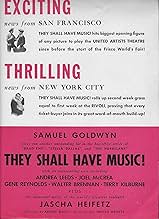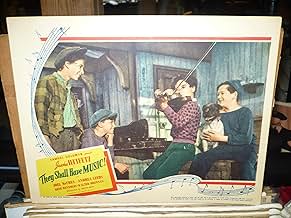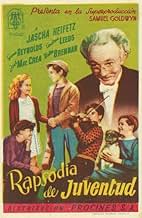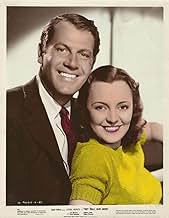अपनी भाषा में प्लॉट जोड़ेंA boy runs away from home and ends up at a music school for poor children. When the school suffers hard times, he enlists the aid of violinist Heifetz to save the day.A boy runs away from home and ends up at a music school for poor children. When the school suffers hard times, he enlists the aid of violinist Heifetz to save the day.A boy runs away from home and ends up at a music school for poor children. When the school suffers hard times, he enlists the aid of violinist Heifetz to save the day.
- 1 ऑस्कर के लिए नामांकित
- 3 जीत और कुल 1 नामांकन
Gale Sherwood
- Betty
- (as Jacqueline Nash)
Alexander Schoenberg
- Menken
- (as Alexander Schonberg)
फ़ीचर्ड समीक्षाएं
They Shall Have Music from 1939 stars violinist Jascha Heifetz as himself, Joel McCrea, Gene Reynolds, Walter Brennan, Marjorie Main, and a favorite performer of mine, Zero the Dog. Directed by Archie Mayo.
The basic story concerns a boy (Reynolds) who runs away from home and winds up in a music school for kids. Gifted musically, he attempts to help the school stay open by appealing to Heifetz.
The star, of course, is Heifetz' magnificent playing. Though the film states he plays a Stradivarius, that violin name was thought to be more recognizable to audiences than his actual instrument, a Guarnarius. How wonderful to have Heifetz' gorgeous work on film.
If you like opera, you haven't lived until you've heard nine-year-old Gale Sherwood singing Caro Nome. I know hearing a child squeak out the coloratura was a life-changing experience for me.
In fact, Gale Sherwood grew up to be a lovely soprano who made films, did a nightclub act with Nelson Eddy, performed The Desert Song on tv, and Showboat at the LA Music Center. Then she moved to Florida and retired. She can be heard as an adult on YouTube.
I saw Zero the Dog in High Sierra. His role on that film was a tad more dramatic, but he was a delightful thespian and did a great job in this.
The basic story concerns a boy (Reynolds) who runs away from home and winds up in a music school for kids. Gifted musically, he attempts to help the school stay open by appealing to Heifetz.
The star, of course, is Heifetz' magnificent playing. Though the film states he plays a Stradivarius, that violin name was thought to be more recognizable to audiences than his actual instrument, a Guarnarius. How wonderful to have Heifetz' gorgeous work on film.
If you like opera, you haven't lived until you've heard nine-year-old Gale Sherwood singing Caro Nome. I know hearing a child squeak out the coloratura was a life-changing experience for me.
In fact, Gale Sherwood grew up to be a lovely soprano who made films, did a nightclub act with Nelson Eddy, performed The Desert Song on tv, and Showboat at the LA Music Center. Then she moved to Florida and retired. She can be heard as an adult on YouTube.
I saw Zero the Dog in High Sierra. His role on that film was a tad more dramatic, but he was a delightful thespian and did a great job in this.
For many years, Samuel Goldwin tried to bring his friend Jascha Heifetz to the screen. One evening when Goldwyn and his wife Frances were having dinner with Heifetz and his wife, silent screen star Florence Vidor, Goldwyn proposed that Heifetz star in a movie. After some persuasion, Heifetz agreed, on the condition that his acting be kept to a minimum. And the movie, originally titled "Music School" was born.
The story itself is rather stock: A streetwise boy (Gene Reynolds, who is best known as the producer of "M*A*S*H"), runs away from home and ends up at a financially troubled music school run by Professor Lawson (Walter Brennan). While attempting to raise funds for the school, the boy and some other kids happen across Heifetz at Carnegie Hall. After much ado, Heifetz ends up appearing at the school concert and sponsoring the school.
The story, while predictable,is surprisingly well written, although the film contains several minor gaffes where different scenes were patched together, the most obvious being the young cellist who is sent out of the orchestra room on an errand and is seen sitting in the orchestra a few seconds later.
What is not surprising is how good the acting is. As was customary for studios then, the studio surrounded the inexperienced star with veteran talent: Brennan, Joel McCrea, Andrea Leeds, Porter Hall, Marjorie Main (later of Ma and Pa Kettle fame), Arthur Hohl, Paul Harvey, and a Who's Who of character actors. Actress Diana Lynn and singer/actress Kaye Connor made their (uncredited) debuts in this film, as did longtime Nelson Eddy singing partner Gale Sherwood (as Jacqueline Nash). Child veteran actors Reynolds, Walter Tetley and Terry Kilburn also appear.
Goldwyn hired the Peter Meremblum Symphony, a highly regarded youth orchestra from the Los Angeles Area, to appear in the film. Most of the kids in the orchestra weren't actors, although many were in demand as background players where children were needed. There was no question that they were excellent musicians, as good as professionals (which many of them later became). Many of the kids in the orchestra went on to noteworthy careers: Kaye Connor and Diana Lynn both starred in the theater and movies, Richard Berres was a producer and director, Mitchell Lurie founded a well-known music supply company, Elliott Rapaport went on to be a prominent cardiologist, Lewis Elias was a band leader, Thomas Facey a conductor with different symphonies, Channing Robbins a prominent instructor at the Julliard School, his sister Joyce Robbins an instructor with SUNY Stonybrook. Edwina Pierse(Smith-Johnson) was a teacher and concertmistress and 1st violin with the Long Beach Symphony for over 50 years, Virginia Ellis a teacher and in-demand soloist Mary Louise Zeyen a longtime cellist with the Los Angeles Philharmonic, and many others pursued musical careers with major symphony orchestras and as teachers.
While Heifetz's acting was kept to a minimum, his salary wasn't. He commanded $70,000 for seven weeks. When some scenes had to be re-shot at a later date, he got an additional $50,000 for another four weeks. What thankfully wasn't kept to a minimum was his musical output. Composer Alfred Neumann (who was once a Meremblum Orchestra conductor) handled the scoring. Heifetz performs the "Introductionne and Rondo Capriccioso" by Camille Saint-Saens, his own arrangement of Manuel Ponce's "Estrellita" (with an off-screen Teddy Saidenberg accompanying), Dinicu's devilishly difficult "Hora Staccato" (from a Vitaphone recording, with Emanuel Bay at the piano), an excerpt from Tchaikovsky's "Melodie (Saidenberg at the piano)", an excerpt arranged for violin solo from Tchaikovsky's well-known "Andante Cantabile" from his opus 11 string quartet (played during the opening credits at the beginning of the movie), and the final movement from Felix Mendelssohn's E Minor Violin Concerto. During all of these performances, there are many closeups of Heifetz's performing, including some very close shots of his fingering and bowing, something that would be of value to violinists desiring to study his technique.
The Meremblum orchestra also shines here, performing the arias "Caro Nome" by Verdi and "Casta Diva" by Bellini, (both with Sherwood singing ), an arrangement of the overture from Rossini's "Barber of Seville", a short excerpt from Mozart's "Eine Kleine Nachtmusik", and the previously-mentioned Mendelssohn concerto (with Heifetz). Diana Lynn can be heard in the background of one scene, performing part of Chopin's Nocturne in B-flat Minor, and a five year old Mary Ruth performs Chopin's popular "Minute" Waltz.
All in all, this is an excellent movie. AMC showed this regularly up until early 1993. I haven't seen it on television in recent years, but copies of it are not difficult to obtain. If you have the chance, I highly recommend that you view the movie.
The story itself is rather stock: A streetwise boy (Gene Reynolds, who is best known as the producer of "M*A*S*H"), runs away from home and ends up at a financially troubled music school run by Professor Lawson (Walter Brennan). While attempting to raise funds for the school, the boy and some other kids happen across Heifetz at Carnegie Hall. After much ado, Heifetz ends up appearing at the school concert and sponsoring the school.
The story, while predictable,is surprisingly well written, although the film contains several minor gaffes where different scenes were patched together, the most obvious being the young cellist who is sent out of the orchestra room on an errand and is seen sitting in the orchestra a few seconds later.
What is not surprising is how good the acting is. As was customary for studios then, the studio surrounded the inexperienced star with veteran talent: Brennan, Joel McCrea, Andrea Leeds, Porter Hall, Marjorie Main (later of Ma and Pa Kettle fame), Arthur Hohl, Paul Harvey, and a Who's Who of character actors. Actress Diana Lynn and singer/actress Kaye Connor made their (uncredited) debuts in this film, as did longtime Nelson Eddy singing partner Gale Sherwood (as Jacqueline Nash). Child veteran actors Reynolds, Walter Tetley and Terry Kilburn also appear.
Goldwyn hired the Peter Meremblum Symphony, a highly regarded youth orchestra from the Los Angeles Area, to appear in the film. Most of the kids in the orchestra weren't actors, although many were in demand as background players where children were needed. There was no question that they were excellent musicians, as good as professionals (which many of them later became). Many of the kids in the orchestra went on to noteworthy careers: Kaye Connor and Diana Lynn both starred in the theater and movies, Richard Berres was a producer and director, Mitchell Lurie founded a well-known music supply company, Elliott Rapaport went on to be a prominent cardiologist, Lewis Elias was a band leader, Thomas Facey a conductor with different symphonies, Channing Robbins a prominent instructor at the Julliard School, his sister Joyce Robbins an instructor with SUNY Stonybrook. Edwina Pierse(Smith-Johnson) was a teacher and concertmistress and 1st violin with the Long Beach Symphony for over 50 years, Virginia Ellis a teacher and in-demand soloist Mary Louise Zeyen a longtime cellist with the Los Angeles Philharmonic, and many others pursued musical careers with major symphony orchestras and as teachers.
While Heifetz's acting was kept to a minimum, his salary wasn't. He commanded $70,000 for seven weeks. When some scenes had to be re-shot at a later date, he got an additional $50,000 for another four weeks. What thankfully wasn't kept to a minimum was his musical output. Composer Alfred Neumann (who was once a Meremblum Orchestra conductor) handled the scoring. Heifetz performs the "Introductionne and Rondo Capriccioso" by Camille Saint-Saens, his own arrangement of Manuel Ponce's "Estrellita" (with an off-screen Teddy Saidenberg accompanying), Dinicu's devilishly difficult "Hora Staccato" (from a Vitaphone recording, with Emanuel Bay at the piano), an excerpt from Tchaikovsky's "Melodie (Saidenberg at the piano)", an excerpt arranged for violin solo from Tchaikovsky's well-known "Andante Cantabile" from his opus 11 string quartet (played during the opening credits at the beginning of the movie), and the final movement from Felix Mendelssohn's E Minor Violin Concerto. During all of these performances, there are many closeups of Heifetz's performing, including some very close shots of his fingering and bowing, something that would be of value to violinists desiring to study his technique.
The Meremblum orchestra also shines here, performing the arias "Caro Nome" by Verdi and "Casta Diva" by Bellini, (both with Sherwood singing ), an arrangement of the overture from Rossini's "Barber of Seville", a short excerpt from Mozart's "Eine Kleine Nachtmusik", and the previously-mentioned Mendelssohn concerto (with Heifetz). Diana Lynn can be heard in the background of one scene, performing part of Chopin's Nocturne in B-flat Minor, and a five year old Mary Ruth performs Chopin's popular "Minute" Waltz.
All in all, this is an excellent movie. AMC showed this regularly up until early 1993. I haven't seen it on television in recent years, but copies of it are not difficult to obtain. If you have the chance, I highly recommend that you view the movie.
I really enjoyed this movie, and I'm not a classical music fan. The story of the tough street kid discovering classical music and changing his ways was great to watch, without being sentimental or too unbelievable, although some details had me scratching my head (Frankie and his dog can live in the basement of the school without any of the students or teachers discovering him? Where did he eat? Bathe? Did he ever get a change of clothes? What did he feed his dog? The owner of the school didn't think it was important to notify the police about finding a missing boy, but let him live in the basement indefinitely? :-) ). But we can let such unrealistic details slide and just enjoy the touching, fun, and slightly suspenseful (for me, anyway) story and wonderfully talented children.
I loved the scene with the mothers standing shoulder to shoulder on the steps barring the policemen from entering the school: I doubt they would get away with that nowadays. And I liked the nice touch about the boy Frankie stole from turning the tables on him (although that never really went anywhere), and Frankie's friends helping him out in the end.
All in all, a great movie for everyone!
I loved the scene with the mothers standing shoulder to shoulder on the steps barring the policemen from entering the school: I doubt they would get away with that nowadays. And I liked the nice touch about the boy Frankie stole from turning the tables on him (although that never really went anywhere), and Frankie's friends helping him out in the end.
All in all, a great movie for everyone!
You may have heard that music is the universal language. Nowhere is that more true than in Archie Mayo's "They Shall Have Music". It focuses on a troubled boy who runs away from home and joins a struggling music school. Things take a turn when Jascha Heifetz (playing himself) enters the scene.
The movie addresses poverty and funding for the arts. And in the process, we get to hear some masterful performances of works by the great composers (and of course, during the Barber of Seville overture, I pictured Bugs Bunny subjecting Elmer Fudd to all sorts of humiliation to the tune of the overture). No surprise that the children perform the music exquisitely, since Samuel Goldwyn hired the Meremblum Orchestra to star in the movie.
It might not be the greatest movie ever made, but I hope that it reminds people of the importance of the arts. Indeed, during WWII, Winston Churchill got asked if he planned to cut funding for the arts to redirect the money to the armed forces, and he said "Then what are we fighting for?" Alfred Newman's Academy Award-nominated score is like a character by itself. I definitely recommend this movie.
The movie addresses poverty and funding for the arts. And in the process, we get to hear some masterful performances of works by the great composers (and of course, during the Barber of Seville overture, I pictured Bugs Bunny subjecting Elmer Fudd to all sorts of humiliation to the tune of the overture). No surprise that the children perform the music exquisitely, since Samuel Goldwyn hired the Meremblum Orchestra to star in the movie.
It might not be the greatest movie ever made, but I hope that it reminds people of the importance of the arts. Indeed, during WWII, Winston Churchill got asked if he planned to cut funding for the arts to redirect the money to the armed forces, and he said "Then what are we fighting for?" Alfred Newman's Academy Award-nominated score is like a character by itself. I definitely recommend this movie.
This is a remarkable and wonderful film. In 1939, the classical violinist Jascha Heifetz (generally regarded by common consent in the classical music world as the greatest violinist of the 20th century, which is certainly my view) was actually a popular icon in America. So far have cultural standards declined that such a thing would be impossible to imagine today, in a world contaminated by Madonnas and Kylies and other such low life characters who prance around showing off their tits and bottoms and think of themselves as 'musicians'. And so Samuel Goldwyn decided to make a whole feature film around Heifetz, admirably directed by Archie Mayo. The story is first rate, and Heifetz is portrayed as a stratospheric and inaccessible concert star who happens to run into a poor kid in New York, through a series of amusing circumstances, and thereby becomes involved with the fate of a music school for disadvantaged urban children. The school is continually threatened with closure through lack of funds, but no one dares tell the idealistic head of the school, played by the endearing Walter Brennan, that there are drastic debts owing and angry creditors at the door. In one hair-raising scene, a ruthless music instrument supplier has removal men seize all the instruments from the children of the school's orchestra when they are in the middle of a concert. Joel McCrea is very good as the cheerful beau of Brennan's daughter, sympathetically played by Andrea Leeds, who cheerfully loses his job in order to help support the school and the cause of encouraging poor children to learn music. The star of the film is Gene Reynolds, who plays the poor boy Frankie at the centre of the story who enters the school because he has perfect pitch (or 'a good ear', as Brennan modestly puts it). Reynolds is admirably supported by one of the finest canine actors of the period, a little dog called Zero, who plays the character Sucker, a dog who is Frankie's inseparable companion. Child actor Terry Kilburn is also extremely good as Frankie's younger friend Limey, so named because he is British and sounds it. He is such a cheerful little chap. This film was entitled RAGGED ANGELS in a re-release at a later date in America, but in Britain was called MELODY OF YOUTH. Jascha Heifetz plays numerous extended virtuoso pieces in this film, such as RONDO CAPRICCIOSO by Camille Saint-Saens. No trouble is spared to film him from every angle, with plenteous close-ups of his fingers, his bowing technique, and views of him of every description. He also speaks and briefly 'acts' in a few scenes. From the point of view of the history of music and the violin, this film is a 'must-see' because of the extensive coverage given to Heifetz, around whom the whole film revolves. It was the first time he had appeared in a film. As all who have ever seen archive film of him playing know, Heifetz showed absolutely no emotion when he played, but while remaining as formal as a Greek statue, he could wring more emotion out of his violin than anyone since Paganini, and more than anyone since. He was simply the greatest. And what a treasure this film is, to contain such an early record of his performing. As for the film itself, it is charming and delightful, and most entertaining. It is most emphatically not just a story strung carelessly together to provide an excuse for getting Heifetz on screen. In fact, it is a pity that young people interested in music today cannot all be shown this film in school. I would recommend most strongly to any parents with a child serious about classical music that they show this film to the child. It also carries an important message about the power of music to uplift those who are in unfortunate circumstances and in great poverty. The scene where the mothers of the children block the entrance to the school to stop the men coming in to seize the instruments is touching testimony to how hard times produce backbone and determination. The social lesson is the need to spread classical music more widely through all levels of society. After all, it is such a civilising influence, and there are not many civilising influences left, are there? Isn't it better to be taught to play an instrument and to take part in a student orchestra than to sit at home playing computer games in which you kill people until you are so brutalised that you then pick up a gun from your father's gun cabinet yourself and carry out one of those school massacres? All of those student atrocities I blame on the parents, by the way, since the kids who carry them out are always the spoilt brats of spineless affluent upper middle class families, whose parents should be locked up as incompetents and enablers of their psychopathic offspring. Anyone in search of a bit of sanity in a world full of bad parents and vicious spoilt kids should watch this film, to remember that there was an innocent time when the worst entertainment to which children used to be exposed was likely to be the insipid charms of cowboy heroes like Gene Autrey and Roy Rogers, or perhaps a highly unconvincing monster from outer space invading the earth. Today all the monsters are here already, and do not need to be imported from other worlds. The 'other world' of today is the world of yesterday.
क्या आपको पता है
- ट्रिवियाIn the movie, the newspaper account lists Jascha Heifetz's stolen violin as a Stradivarius. Heifetz used a Guarnarius in the picture and favored that violin in real life, but the producers felt that the name of Stradivarius would be more recognizable.
- गूफ़Throughout the picture, the kids in the orchestra are caught looking into the camera or eyeing it sideways, licking their lips, fidgeting, etc.
- साउंडट्रैकAndante cantabile
from "String Quartet No.1 in D, Op.11" (1871) (uncredited)
Written by Pyotr Ilyich Tchaikovsky
In the score during the opening credits
Reprised a bit by Gene Reynolds (violin)
टॉप पसंद
रेटिंग देने के लिए साइन-इन करें और वैयक्तिकृत सुझावों के लिए वॉचलिस्ट करें
- How long is They Shall Have Music?Alexa द्वारा संचालित
विवरण
- रिलीज़ की तारीख़
- कंट्री ऑफ़ ओरिजिन
- भाषा
- इस रूप में भी जाना जाता है
- Rapsodia de juventud
- फ़िल्माने की जगहें
- उत्पादन कंपनी
- IMDbPro पर और कंपनी क्रेडिट देखें
- चलने की अवधि1 घंटा 42 मिनट
- रंग
- पक्ष अनुपात
- 1.37 : 1
इस पेज में योगदान दें
किसी बदलाव का सुझाव दें या अनुपलब्ध कॉन्टेंट जोड़ें
























